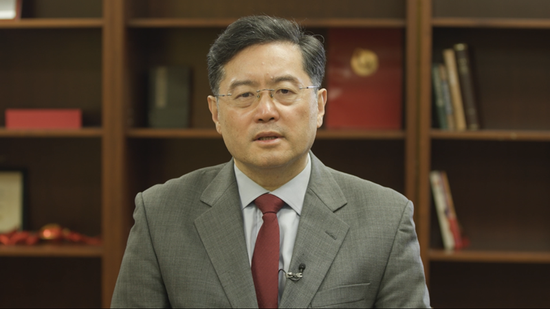Remarks by Ambassador Qin Gang at the Commemoration of the 50th Anniversaryof the First China Trips by the US Congress
Mr. Wang Chao,
Distinguished Guests,
Ladies and Gentlemen,
Friends,
The gate of China-US relations was opened in 1972. 50 years ago, President Richard Nixon paid a historic visit to China. Then in the same year, Senate Majority Leader Michael Mansfield and Minority Leader Hugh Scott, and House Majority Leader Hale Boggs and Minority Leader Gerald Ford followed in President Nixon’s footsteps, and led two consecutive visits to China. These were the first China trips by the US Congress, and they have also been marked in the annals of history.
In Senator Mansfield’s report to the Congress about the visit, he wrote: “It is difficult to look at China, today, free of the distortions of national disparities, especially after two decades of separation. But the distortions can be tempered by perspective. It is possible, for example, to judge a bottle as half full or as half empty. If China is measured by some of our common yardsticks, whether they be highway mileage, the number of cars, television sets, kitchen gadgets, political parties, or newspaper editors — the bottle will be seen as half empty. If China is viewed in the light of its own past, the bottle is half full and rapidly filling.” Representatives Boggs and Ford also said after their trip, “it is in the interest of our peoples and in the interest of international peace for us to learn to live together in peace and mutual respect.” These remarks, though made 50 years ago, are still resonating and relevant today.
Ladies and Gentlemen,
The China-US relationship is at another historical juncture, just like 50 years ago. It is in a new round of mutual exploration, understanding, adaptation and balancing.
In the context of severe and complex China-US relations, we should not set eyes on our differences only. Rather, we should bear in mind our common interests, and show strategic vision, political courage and diplomatic wisdom. We should learn from history, overcome difficulties and challenges, rebuild trust, and take China-US relations back to the right track.
We need to take a strategic and long-term view, look far and wide, follow the trend of the times and the call of the people, and see China-US relations as mutually dependent and beneficial. We must avoid misunderstanding and miscalculation caused by individual events, and make China-US relations free from the “Thucydides Trap” or “the tragedy of great power politics”.
We need to strengthen communication, enhance mutual understanding and trust, respect each other, and treat each other as equals. People should not use American yardstick to judge China, or follow the ideological and binary narrative of “Democracy versus Authoritarianism”, or over-simplify China-US relations as “competition”.
We need to promote cooperation in various fields and expand common interests. Recently I visited America’s West Coast and also some Midwestern states. From all the forums on energy, the environment, sustainable development, agriculture, tourism, and people-to-people exchanges that I attended during the trips, I felt keenly people’s passion for developing cooperation with China, from economic and trade ties, to people-to-people exchanges, and to climate change cooperation. I could tell that they all support investment from China, they welcome Chinese students, and they look forward to exporting more agricultural products to China.
We need to manage differences and prevent crises. The Taiwan question is the most important and sensitive issue in China-US relations, and concerns China’s core interests. The one-China principle is the unshakable political foundation of the China-US relationship, and a red line not to be crossed. We hope that the US will honor its 50-year political commitments on Taiwan, stop hollowing out the one-China principle, stop emboldening or abetting “Taiwan independence” separatist activities, and stop playing the “Taiwan card” in China-US relations. Only in this way can we truly maintain peace and stability across the Taiwan Strait and avoid major crises between our two countries.
Ladies and Gentlemen,
Mutual respect, peaceful coexistence and win-win cooperation are the way for China and the United States to get along. This was the case 50 years ago, and they are still the basic principles for our relations today and in the years ahead. Our commemoration of the historic visits 50 years ago is just to draw experience from history, ensure China-US relationship will stay the course, and realize its sound and stable development for the next 50 years!
Thank you!

